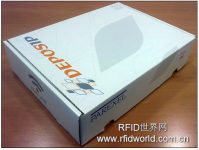
Parexel launches RFID temperature detection system for testing drugs
[ad_1]
Biotechnology company Parexel International has developed an RFID system to ensure that the temperature of products used in clinical trials exceeds the standard value during transportation. Parexel plans to introduce the system in 2010 to track the process of global transportation to hospitals from the supply chain.
Parexel uses active RFID tags embedded with temperature sensors and uses mobile phones to access data. If the system test report results are successful, it will be imported into the biotech company it serves. The system can ensure whether the product exceeds the standard value during the transportation process.
Clinical trial drug pairs need to properly monitor the temperature of stored drugs. Therefore, some products require temperature records. It is very important to accurately report the temperature of the stored medicine and its quality effect to avoid complications caused by the user.

Parexel puts the medicine in a carton, which contains a temperature sensor connected to the RFID tag embedded in the carton
In the past, a temperature recorder was placed in the box that shipped the product. When the researcher or physician opened the box, he needed to take out the temperature recorder, input the displayed temperature into the Parexel system, and then transmit the data to Parexel. Server, check whether the product meets the qualified standards, or use USB to download the data, and then upload it to the server.
This system has many shortcomings, such as: the researcher needs to check the temperature recorder, input data or download data via USB, which is very time-consuming. From the above-mentioned work time to the process of receiving data and checking whether Parexel is qualified or not, it takes 24 hours.
In addition, the current laws and regulations have become more stringent in terms of the environmental conditions for product delivery, and Parexel hopes to introduce a system to ensure the safety and convenience of the delivery process.
At the beginning of 2010, Parexel began to develop a system that uses active 13.56 MHz RFID tags, which complies with ISO 14443a and 15693 standards, and supports NFC. The challenge for Parexel is to design a system that is easy to use and universal. Parexel embeds the NFC sensor chip in the mobile phone, uses the mobile phone to receive messages, and can send the data back to the server.
Parexel packs the bottled liquid products (using fake products for system testing) and packs them into boxes. An RFID tag with a temperature sensor is embedded on one side of the box. The staff who packaged and shipped the product activated the tag, used the date and time of the package, and sent the data to the server using an RFID mobile phone.
Pack the boxes one by one and attach the RFID mobile phone. During transportation, the sensor reads the temperature every ten minutes, and the RFID tag is used to access the data storage. When the product arrives at the destination, the researcher turns on the mobile phone in the box and reads the label on the box, which is the temperature of the product.
After reading the data, use the mobile phone to transfer the data to the Parexel server. If the product temperature exceeds the standard value, the system will send a message notification. Whether the product has been clinically tested and whether the temperature during transportation is within a safe range, all procedures can be completed within a few minutes before it can be used by patients, which solves the time required for manual data input.
In summary, Parexel will introduce the RFID system to track products that require temperature control. The system not only saves labor costs, but also saves operating time. When the product is being shipped, it can be more clearly understood whether the product temperature is within a safe range.
[ad_2]



